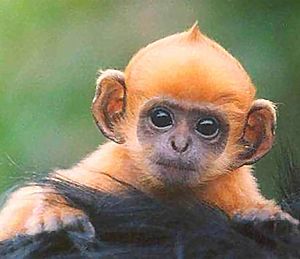Monkey meat facts for kids
Monkey meat is the flesh and other edible parts that come from monkeys. It is a type of bushmeat, which means wild animals hunted for food. People have eaten monkey meat for a very long time in many parts of the world, especially in some countries in Asia and Africa. There have also been reports of it being eaten in parts of Europe and the Americas.
Contents
Where Monkey Meat is Eaten
Africa
Liberia
In 2014, a TV show called Vice News showed that eating monkey meat is quite common in Liberia. Local people said it tastes "sweet." They also didn't seem too worried about catching diseases that can come from eating wild animals.
Republic of the Congo
In the Congo, many people see monkey meat as a special food. It's often cooked by grilling, boiling, or frying it. Monkey bodies are quite valuable, sometimes selling for a lot of money. During a big sports event in Brazzaville in 2015, a reporter noticed that people really wanted to buy monkey meat. Sadly, a type of monkey called the Miss Waldron's red colobus might have been completely eaten by people and disappeared by 2001.
Cameroon
In Cameroon, about 80 out of every 100 parts of meat eaten come from monkeys and apes. About 3,000 gorillas are killed each year for illegal meat markets. This is a big problem for these animals.
South Sudan
Eating monkey meat is a special tradition for the Bari people in South Sudan. They see it as something that sets them apart from other groups. However, lately, some Bari people have stopped eating it. This is because monkeys look very similar to humans.
Americas
United States
In 2007, The New York Times reported that monkey meat was secretly brought into the United States. It was often hidden as other types of meat. It is against the law to bring bushmeat into the U.S. If border officers find monkey meat, they will take it and destroy it. People caught bringing it in can be fined a lot of money, up to US$250,000.
Mexico
Dishes made from spider monkeys are popular among some native groups in Southern Mexico. People hunt them all year, even though it's not allowed between March 1 and October 31. In Los Tuxtlas, Veracruz, eating monkey meat was popular before 2010. But as more people ate it, the number of monkeys in the area went down. This made monkey meat harder to find.
Asia and Pacific Islands
Cambodia
In October 2016, police raided a market in Stung Treng. They found and took away two kilograms of dried monkey meat.
China
Monkey meat has traditionally been seen as a special food in China. Some people also believed it had healing powers. In 1934, eating monkey meat was banned in Guangdong. The rule said that monkeys are smart and similar to humans, so they should be protected.
India
In April 2014, pictures of many dead monkeys in Chhattisgarh went viral. These monkeys were meant to be eaten. Even though animal lovers were upset, government officials didn't do much. They even doubted if the pictures were real. This is because monkeys are considered sacred in most parts of India.
Indonesia
Most people in Indonesia are Muslim, and they usually do not eat monkey meat. However, in Sulawesi, there is a group called the Minahasan. They are not Muslim and are known for eating monkeys. They think the crested black macaque is a special treat.
Japan
In some parts of Japan, like Hongū and Nagano, monkey meat was once seen as a special food. Today, it is very rarely eaten. There's an old saying in Nagano: "Don't feed your wife autumn monkey – to do so would be to waste a fine-tasting delicacy." People used to believe that eating monkey meat had many health benefits. For example, Japanese women supposedly ate it after giving birth to get their energy back.
Vietnam
In September 2015, a red-shanked douc monkey was killed at a restaurant in Vu Quang, Vietnam. Its body was reportedly sold for two million Vietnamese dong.
Health Risks
Eating monkey meat can be bad for your health. A study in 1992 found cases of salmonellosis, a type of food poisoning, linked to eating monkey meat. Because humans and monkeys are very similar in their bodies, humans can easily catch diseases and viruses that might be in the monkey meat.
 | Dorothy Vaughan |
 | Charles Henry Turner |
 | Hildrus Poindexter |
 | Henry Cecil McBay |


